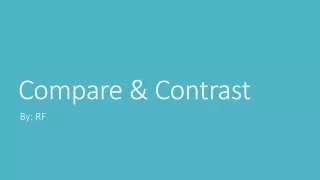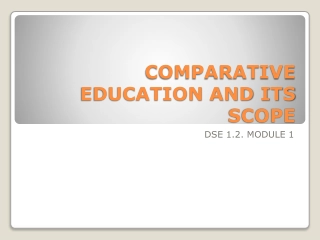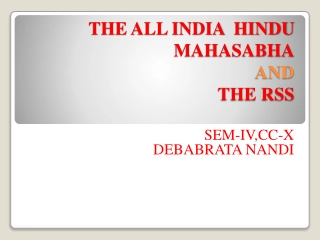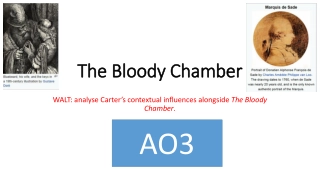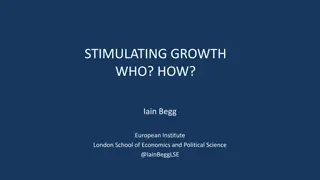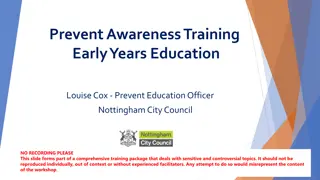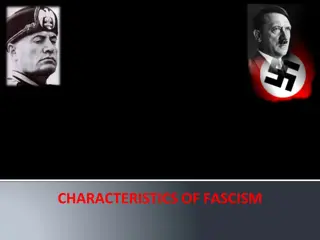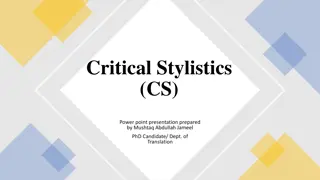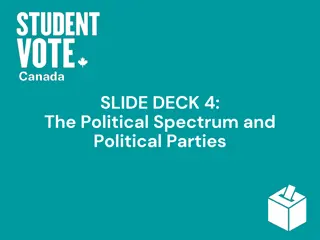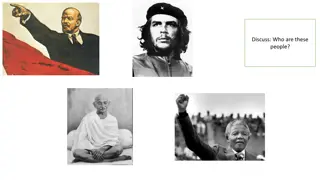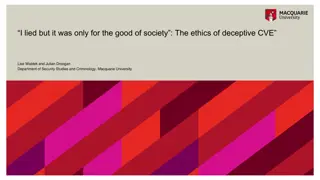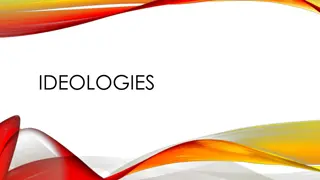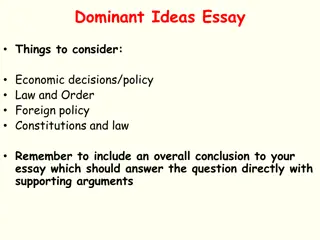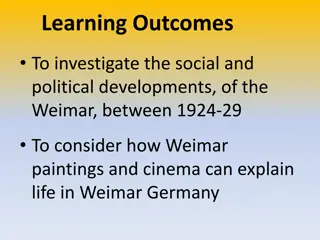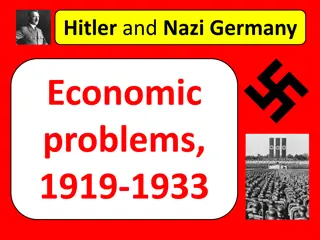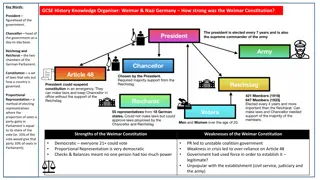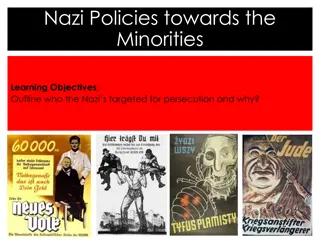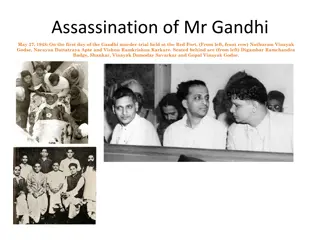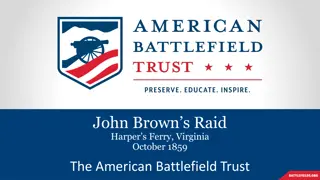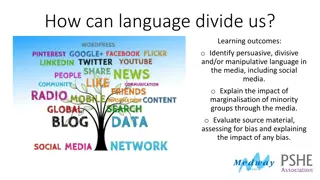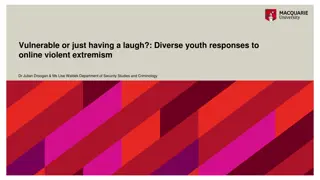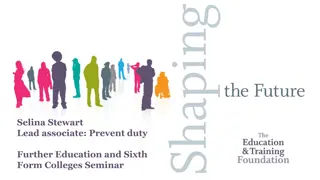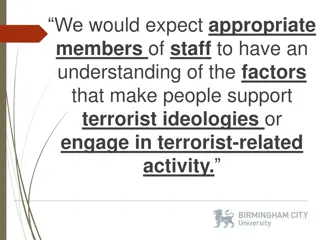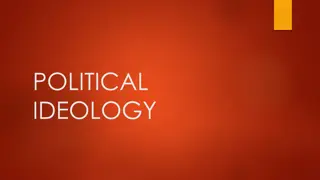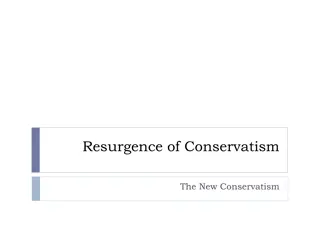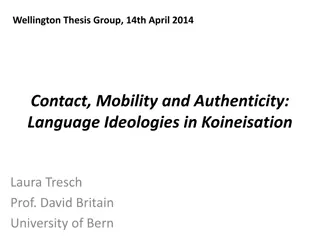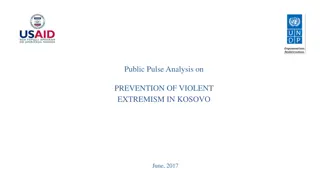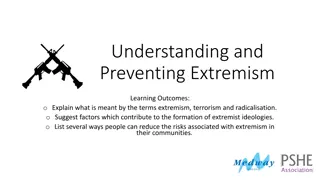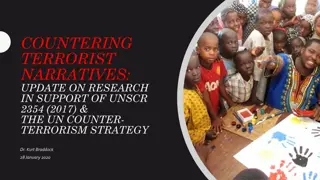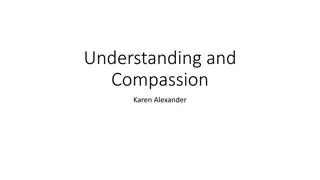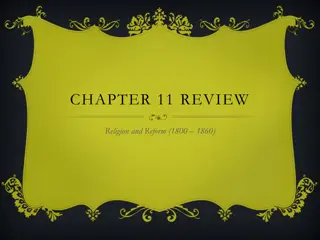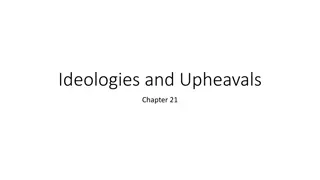Compare & Contrast
Similarities and differences in the ideologies of Thomas Hobbes and John Locke, focusing on their views on the state of nature, social contract, and forms of government.
4 views • 8 slides
Comparative Education and its Scope
The discipline of Comparative Education, its scope, and its impact on educational systems worldwide. Analyze different perspectives, geographical units, ideologies, themes, and historical development.
10 views • 6 slides
The All India Hindu Mahasabha: History and Impact
The All India Hindu Mahasabha is a right-wing Hindu nationalist political party in India formed to protect Hindu community rights. Despite being old, it has had marginal influence on politics. The Mahasabha emphasized Hindu solidarity and social reform, founded in the early 1900s by leaders like Pan
2 views • 11 slides
Angela Carter and Her Influential Works: A Contextual Analysis
Angela Carter, an English novelist known for her feminist and magical realism works, was influenced by her personal experiences and feminist ideologies. Her notable works include "The Bloody Chamber" and "The Sadeian Woman and the Ideology of Pornography". Carter's unique perspective on women's role
1 views • 26 slides
Understanding Sovereign Citizens: Beliefs and Practices
Sovereign citizens hold unconventional beliefs about government and law, leading to practices like rejecting licenses and using unique legal language. David Wynn Miller, a prominent figure in this movement, has influenced their ideologies. This group's actions can create challenges and legal conflic
3 views • 10 slides
Exploring Nationalism, Universalism, and Secularism in Education: Insights from Tagore and Krishnamurty
Delve into the profound concepts of nationalism, universalism, and secularism in education as elucidated by Dr. V. Regina, Principal at CSI Bishop Newbigin College of Education. The content explores the meanings, philosophies, and celebrations associated with these ideologies, drawing perspectives f
0 views • 22 slides
Status of Family Laws in India: Hindu vs. Religious Minorities
The family and personal status laws in India vary between Hindu law and those pertaining to religious minorities. While Hindu law has seen extensive reforms, discriminatory provisions still exist. In contrast, laws governing religious minorities have undergone fewer reforms, leading to greater inequ
2 views • 4 slides
Approaches to the study of Human Rights
The Marxist perspective on human rights emphasizes social rights over individual rights, viewing the full realization of self within society. Marx connects bourgeois society with human rights, highlighting how exploitation under capitalism alienates individuals. In contrast, the Third World perspect
5 views • 19 slides
Stimulating Growth Who? How
Delve into the strategic challenges faced in stimulating economic growth, including responses to inflation, competition from China, strategic autonomy implications, Europe's technology deficit, aging economy dynamics, and the role of the state in enabling growth. Explore calls for EU public investme
1 views • 7 slides
Prevent Duty Training for Early Years Education Professionals
The Prevent Duty Training for Early Years Education Professionals aims to provide crucial information on the Prevent Duty and responsibilities outlined in KCSIE 2023. The training covers key aspects such as local risk factors, extremist groups affecting youth, recognizing signs of vulnerability in c
1 views • 30 slides
Characteristics of Fascism: A Detailed Examination
This detailed examination delves into the key characteristics of fascism, outlining how fascist regimes wield powerful nationalism, disregard human rights, identify enemies for unification, prioritize military supremacy, promote widespread sexism, control mass media, obsess over national security, a
0 views • 16 slides
Understanding Critical Stylistics: Tools and Application
Critical Stylistics (CS) is a method that delves into the ideological underpinnings of texts through the analysis of linguistic features. Developed by Jeffries, CS focuses on uncovering implicit ideologies embedded in texts by examining stylistic choices. By integrating stylistics and critical disco
2 views • 28 slides
Understanding the Political Spectrum and Ideologies
Explore the political spectrum, ideologies, and the role of government in society. Learn about the differences between the left and right, economic vs social issues, and the debate surrounding traditions and societal change. Dive into discussions on government services, taxes, traditions, and societ
0 views • 15 slides
Revolutionaries Throughout History: From Lenin to George Washington
Explore the lives and ideologies of influential revolutionaries such as Lenin, Che Guevara, Nelson Mandela, Gandhi, and George Washington. Dive into their causes, ideologies, use of violence, and desire for change, drawing parallels between them and assessing their impact on history.
0 views • 16 slides
Deceptive CVE Strategies and Ethical Considerations in Countering Violent Extremism
Exploring the complexities of implementing online CVE programs to divert youth from violent extremist narratives, this article discusses the use of counter-narratives, ethical challenges of deception, and the importance of reflexivity in program design and implementation.
0 views • 13 slides
Overview of Political Ideologies
Explore various political ideologies ranging from individualism to communism, each with distinct beliefs on government intervention, economic policies, and social structures. From libertarianism to fascism, understand the core principles and characteristics that define these ideologies.
0 views • 8 slides
Impact of Dominant Ideas on Electoral Performance: A Comparative Analysis of Thatcherism and New Labour's Third Way
Examining the influence of dominant ideas on electoral success, this essay delves into the contrasting ideologies of Thatcherism and New Labour's Third Way within British politics. By scrutinizing their economic decisions, foreign policies, and overall governance, the essay analyzes how these ideolo
0 views • 8 slides
Critical Thinking in Islamic Methodology
Explore the concept of critical thinking in Islam, identifying key skills and understanding the importance of constructive criticism. Delve into the methodology of thinking in Islam that transcends superficial understanding, enabling individuals to distinguish between good and bad, correct and incor
2 views • 12 slides
Social and Political Developments in Weimar Germany (1924-1929)
The period between 1924 and 1929 in Weimar Germany witnessed greater political stability with the Social Democrats winning most of the votes, although they did not secure a majority. The election results show a decline in support for extremist groups like the Communists and Nazis. Factors contributi
1 views • 29 slides
Economic Crises Faced by Weimar Republic, 1919-1933
The Weimar Republic encountered significant economic challenges between 1919 and 1933, leading to chaos and a surge in extremist support. Major crises included hyperinflation in 1923 and the devastating global Depression starting in 1929. The Treaty of Versailles imposed reparations on Germany, whic
0 views • 24 slides
Challenges Faced by the Weimar Republic in Germany
The Weimar Republic in Germany faced various challenges between 1919 and 1923, including political polarisation, extremist uprisings from both left-wing and right-wing groups such as the Spartacists and Freikorps, economic struggles like hyperinflation, and constant fighting undermining its authorit
0 views • 13 slides
Nazi Persecution of Minorities: Targets and Rationale
The Nazis targeted various groups for persecution, believing in a racial hierarchy where certain races were deemed inferior. They aimed to eliminate those they considered undesirable, including Gypsies, black people, the mentally disabled, homosexuals, and more. The Nazis' actions were driven by the
7 views • 12 slides
The Assassination of Mahatma Gandhi and the Trial of the Conspirators
The assassination of Mahatma Gandhi on January 30, 1948, by a young Hindu extremist sent shockwaves through India. The trial of the accused conspirators, including Nathuram Godse and Narayan Apte, resulted in eight convictions, with Godse and Apte being hanged for the murder. The incident marked a t
0 views • 11 slides
The Impact of John Brown's Raid on Harper's Ferry in 1859
John Brown's raid on Harper's Ferry in 1859 was an attempt to incite a slave rebellion and abolish slavery. Brown believed in the righteousness of his cause, but his actions sparked national debate and differing reactions. While some saw him as a martyr for freedom, others viewed him as a radical ex
2 views • 9 slides
Understanding Language Division in Media Representations
Explore the impact of language in media on marginalization, bias, and divisive perspectives towards minority groups. Reflect on the portrayal of different groups such as teenagers, city bankers, and migrants, and consider how language influences societal divisions and extremist views. Evaluate the r
1 views • 21 slides
Understanding Youth Responses to Online Violent Extremism
Diverse youth responses to online violent extremism are explored in this research, aiming to understand how and why young audiences consume and produce such content. The study delves into how young people define and engage with online violent extremist content, shedding light on their emotional and
0 views • 13 slides
PREVENT Strategy Implementation in Sheffield Schools: Autumn/Winter 2015-16
Raising awareness of the PREVENT strategy in Sheffield schools during the Autumn/Winter term of 2015-16 is crucial for safeguarding and preventing individuals from supporting terrorism. The strategy emphasizes the duty of schools to address all forms of terrorism through various initiatives like wor
0 views • 16 slides
Understanding the Prevent Duty in Further Education and Sixth Form Colleges
The Prevent Duty is a statutory responsibility that applies to various education providers, including those not receiving public funding. It involves safeguarding learners against extremist influences, necessitating risk assessments, clear policies, and staff training. Exploiting vulnerable individu
0 views • 20 slides
Understanding Factors Influencing Support for Terrorist Ideologies
Staff members should possess knowledge on factors driving people towards terrorist ideologies. The Prevent Strategy aims to combat extremism and prevent individuals from engaging in terrorist activities through promoting partnerships and upholding British values. However, challenges such as lack of
0 views • 43 slides
Understanding Political Ideologies: Liberalism and Conservatism Explained
Political ideologies shape beliefs about the role of government and societal balance between the public and private sectors. Liberalism focuses on individual liberty and government intervention for equality, while conservatism emphasizes limited government, traditional values, and free markets. Psyc
0 views • 25 slides
The Resurgence of Conservatism in America
The resurgence of conservatism in America has brought about a clear distinction between conservative and liberal ideologies. Conservatives emphasize limited government intervention, promoting free-market principles, individual liberty, and moral values. On the other hand, liberals advocate for gover
0 views • 14 slides
Language Ideologies in Dialect Contact Situations
The study explores how language ideologies influence the legitimacy and status of different dialect varieties in contact situations. It delves into the construction of power relations, social sameness and difference, and cultural stereotypes through language use. Key concepts such as language ideolo
0 views • 28 slides
Public Pulse Analysis on Prevention of Violent Extremism in Kosovo
Public Pulse Analysis in June 2017 delves into Kosovans' perceptions of violent extremism, resilience of Kosovan society against extremist ideologies, and strategies for increasing resilience through institutional efforts. The study begins with an overview of citizen perceptions from previous years,
0 views • 16 slides
Understanding and Preventing Extremism: Factors, Risks, and Solutions
Explore the definitions of extremism and terrorism, factors contributing to extremist ideologies, ways to reduce risks associated with extremism, and key concepts to understand and prevent radicalization. Delve into the root causes of extremist activities, such as lack of identity, influence from vi
0 views • 12 slides
Advancing Counterterrorism Strategies: Research Updates and Evaluation Methods
Recent research and developments in countering terrorist narratives highlight efforts spanning from pre-radicalization to disengagement phases, emphasizing interventions to challenge extremist ideologies and promote critical thinking. Evaluation tools and recommendations, including the use of quasi-
0 views • 8 slides
Understanding Extremist Risks: Insights and Strategies
Explore the complexities of extremist risk through a lens of psychological and contextual analysis. Delve into the nature of terrorism, different types of terrorism, and the importance of robust risk assessment in preventing, pursuing, protecting, and preparing against terrorist activities.
0 views • 21 slides
Understanding Social Progress and Terrorism: Factors and Solutions
Exploring the socio-economic factors contributing to terrorism and hindering social progress, this content delves into the correlation between unemployment, state repression, violence, and terrorism. Key factors analyzed include weak state capacity, corruption, extremist ideologies, and social injus
0 views • 15 slides
Rabindranath Tagore: The Iconic Man of Letters and His Political Stand
Rabindranath Tagore, the Nobel Prize-winning poet, novelist, and painter, was a modernist humanist who criticized extremist nationalism. He founded Viswa Bharati University as a radical educational experiment. The context of his time, including the Jallianwala Bagh Massacre and the Swadeshi Movement
0 views • 15 slides
Religion and Reform: 19th Century Ideologies and Movements
Explore the influence of individualism through transcendentalism, rural communalism, and urban popular culture in the 1800s. Delve into the ideologies of Ralph Waldo Emerson, Henry David Thoreau, Margaret Fuller, and Walt Whitman. Learn about utopian societies, the Mormon experience, and nativist mo
0 views • 15 slides
Ideologies and Upheavals: Congress of Vienna and Impact
The Congress of Vienna, a gathering of key European powers, aimed to establish lasting peace after Napoleon's defeat. Key agreements included territorial compensation, restoration of monarchs, and the formation of the Holy Alliance. While successful in preventing major wars, the Congress lacked fore
0 views • 19 slides
